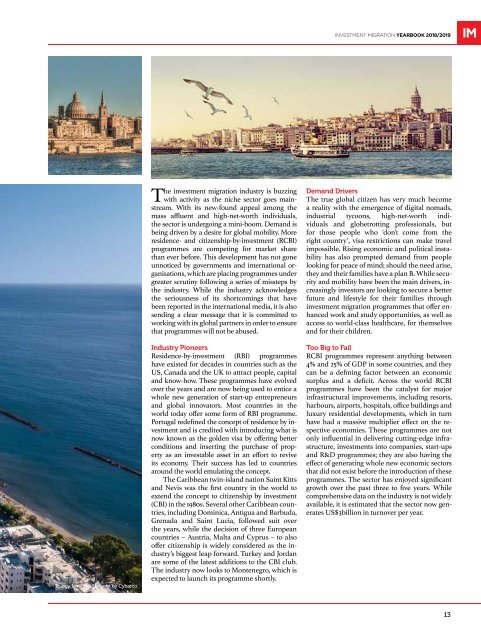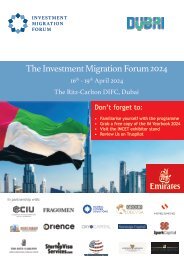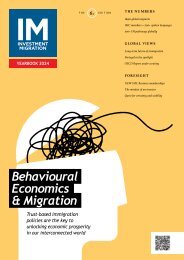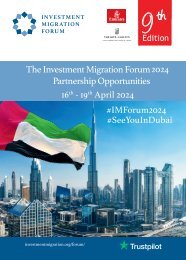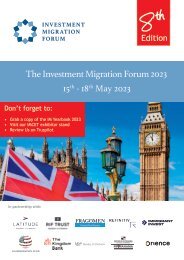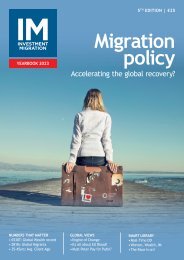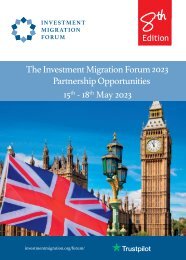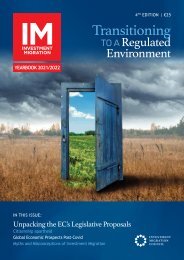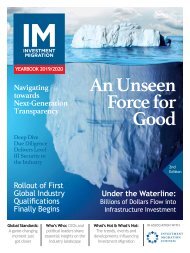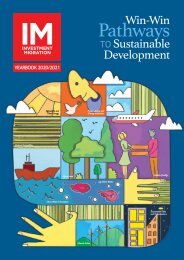IM Yearbook 2018/19
Created out of the need for a global, credible, “go-to” industry publication, the IM Yearbook offers valuable access to a prime target audience of your partners, your peers, and the foremost referral network leading to the world’s most influential RCbI programmes: senior level representatives of the global migration industry, academics, migration agents, migration law firms, wealth managers, UHNWI’s, government representatives, and international organisations involved in migration and citizenship-by-investment.
Created out of the need for a global, credible, “go-to” industry publication, the IM Yearbook offers valuable access to a prime target audience of your partners, your peers, and the foremost referral network leading to the world’s most influential RCbI programmes: senior level representatives of the global migration industry, academics, migration agents, migration law firms, wealth managers, UHNWI’s, government representatives, and international organisations involved in migration and citizenship-by-investment.
- No tags were found...
You also want an ePaper? Increase the reach of your titles
YUMPU automatically turns print PDFs into web optimized ePapers that Google loves.
INVESTMENT MIGRATION YEARBOOK <strong>2018</strong>/20<strong>19</strong><br />
<strong>IM</strong><br />
Trilogy Limassol Seafront by Cybarco<br />
The investment migration industry is buzzing<br />
with activity as the niche sector goes mainstream.<br />
With its new-found appeal among the<br />
mass affluent and high-net-worth individuals,<br />
the sector is undergoing a mini-boom. Demand is<br />
being driven by a desire for global mobility. More<br />
residence- and citizenship-by-investment (RCBI)<br />
programmes are competing for market share<br />
than ever before. This development has not gone<br />
unnoticed by governments and international organisations,<br />
which are placing programmes under<br />
greater scrutiny following a series of missteps by<br />
the industry. While the industry acknowledges<br />
the seriousness of its shortcomings that have<br />
been reported in the international media, it is also<br />
sending a clear message that it is committed to<br />
working with its global partners in order to ensure<br />
that programmes will not be abused.<br />
Industry Pioneers<br />
Residence-by-investment (RBI) programmes<br />
have existed for decades in countries such as the<br />
US, Canada and the UK to attract people, capital<br />
and know-how. These programmes have evolved<br />
over the years and are now being used to entice a<br />
whole new generation of start-up entrepreneurs<br />
and global innovators. Most countries in the<br />
world today offer some form of RBI programme.<br />
Portugal redefined the concept of residence by investment<br />
and is credited with introducing what is<br />
now known as the golden visa by offering better<br />
conditions and inserting the purchase of property<br />
as an investable asset in an effort to revive<br />
its economy. Their success has led to countries<br />
around the world emulating the concept.<br />
The Caribbean twin-island nation Saint Kitts<br />
and Nevis was the first country in the world to<br />
extend the concept to citizenship by investment<br />
(CBI) in the <strong>19</strong>80s. Several other Caribbean countries,<br />
including Dominica, Antigua and Barbuda,<br />
Grenada and Saint Lucia, followed suit over<br />
the years, while the decision of three European<br />
countries – Austria, Malta and Cyprus – to also<br />
offer citizenship is widely considered as the industry’s<br />
biggest leap forward. Turkey and Jordan<br />
are some of the latest additions to the CBI club.<br />
The industry now looks to Montenegro, which is<br />
expected to launch its programme shortly.<br />
Demand Drivers<br />
The true global citizen has very much become<br />
a reality with the emergence of digital nomads,<br />
industrial tycoons, high-net-worth individuals<br />
and globetrotting professionals, but<br />
for those people who ‘don’t come from the<br />
right country’, visa restrictions can make travel<br />
impossible. Rising economic and political instability<br />
has also prompted demand from people<br />
looking for peace of mind; should the need arise,<br />
they and their families have a plan B. While security<br />
and mobility have been the main drivers, increasingly<br />
investors are looking to secure a better<br />
future and lifestyle for their families through<br />
investment migration programmes that offer enhanced<br />
work and study opportunities, as well as<br />
access to world-class healthcare, for themselves<br />
and for their children.<br />
Too Big to Fail<br />
RCBI programmes represent anything between<br />
4% and 25% of GDP in some countries, and they<br />
can be a defining factor between an economic<br />
surplus and a deficit. Across the world RCBI<br />
programmes have been the catalyst for major<br />
infrastructural improvements, including resorts,<br />
harbours, airports, hospitals, office buildings and<br />
luxury residential developments, which in turn<br />
have had a massive multiplier effect on the respective<br />
economies. These programmes are not<br />
only influential in delivering cutting-edge infrastructure,<br />
investments into companies, start-ups<br />
and R&D programmes; they are also having the<br />
effect of generating whole new economic sectors<br />
that did not exist before the introduction of these<br />
programmes. The sector has enjoyed significant<br />
growth over the past three to five years. While<br />
comprehensive data on the industry is not widely<br />
available, it is estimated that the sector now generates<br />
US$3billion in turnover per year.<br />
13


